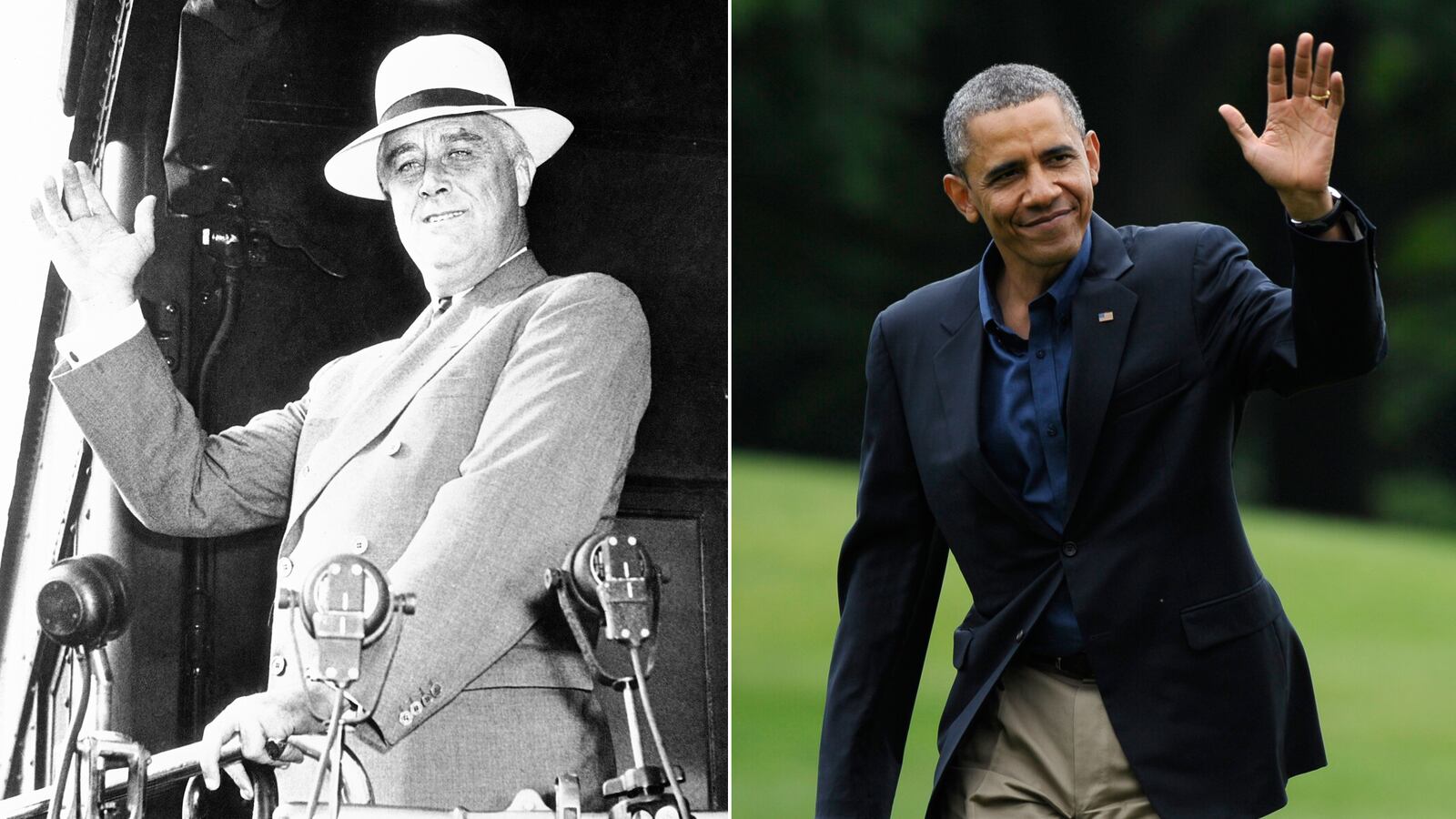Campaigning for a third term as president in 1940, Franklin Roosevelt told an enthusiastic crowd in Cleveland: “You provided work for free men and women ... You used the powers of government to stop the depletion of the top soil ... You wrote into law the right of working men and women to bargain collectively ... You turned to the problems of youth and age … You made safe the banks.”

I was reminded of FDR’s words when I heard President Obama say in his re-nomination acceptance speech at the Democratic Party Convention last September in Charlotte: “You were the change. You’re the reason there’s a little girl with a heart disorder in Phoenix who will get the surgery she needs … You’re the reason a young immigrant who grew up here and went to school here and pledged allegiance to our flag will no longer be deported from the only country she’s ever called home … Only you have the power to move us forward.”
Articulating anew the fundamental democratic truth that democratic change requires democratic propulsion, Obama was urging Americans to recognize his administration’s initiatives as their own and to take responsibility for securing them by turning out in November. But his words led me to think again of what might have been if the president had taken that fundamental democratic truth to heart in 2009 and, like FDR, mobilized popular energies and aspirations to confront the crises of the day, beat the conservative and corporate opposition, and transform the nation for the better—and in turn, had we responded as did the men and women of the 1930s and 1940s by not only pursuing those labors and struggles, but also pushing our president to act ever more progressively with us.
In The Center Holds: Obama and His Enemies, Jonathan Alter, a former Newsweek senior editor and columnist for Bloomberg View, presents the history of the Obama presidency from the Democratic Party’s debacle in the 2010 midterm elections to its victory in the 2012 general election.
Based on dozens of interviews, Alter offers critical insights and informative stories. There is the Inauguration-night dinner party in 2009 hosted by GOP pollster Frank Luntz, at which leading conservatives and Republicans committed themselves to a politics of “obstructionism.” And there is the fundraising dinner at which catering worker Scott Prouty daringly taped Republic presidential-nominee Mitt Romney dismissing the “47 percent” of Americans who, in his words, refuse to “take personal responsibility and care for their lives.” And along the way, Alter illustratively damns the Tea Party, right-wing rich folk, conservative Republicans, and the self-destructive GOP “clown car” of presidential candidates for their eagerness to portray Obama as a fascist or a communist, when not making him out to be a foreigner, not to mention their perverse dismissal of science.

Moreover, Alter impressively details how the Obama campaign put together and coordinated an unprecedented organization of high-tech analysts, social-media teams, and grassroots organizers to make sure they were on top of every detail, donor, and voter. He does not, however, ignore the president’s own faults and failings. In particular, he attends to Obama’s strange unwillingness as a politician to “schmooze” with donors and his lack of political experience in negotiating with Republicans, both of which cost him and us dearly. But Alter clearly admires Obama and what he has done, to the point of being too ready at times to dismiss liberal impatience with and criticisms of the president for reaching out to the right, setting up the National Commission on Fiscal Responsibility and Reform (the Simpson-Bowles commission), and “putting everything on the table.”
Alter and I see the Obama presidency and “what might have been” somewhat differently. He sees Obama not as having failed to initiate a “new New Deal” and progressive politics but as having nearly done so, in preventing a total collapse of the economy, securing a massive stimulus package, and enacting national health care. As Alter wrote at the close of his 2010 book on the first year of Obama’s presidency, The Promise, “Barack Obama was in the company of Franklin Roosevelt and Lyndon Johnson now in terms of domestic achievement, a figure of history far beyond the color of his skin.”
Still, I do agree with Alter on what was at stake in the 2012 elections. As he puts it: “The social contract established during the New Deal era was on the line.”
As Alter reminds us, not just Rick Perry and company, but Romney too—especially when he “doubled-down” and chose Wisconsin congressman and Ayn Rand fan Paul Ryan as his running mate—were making it very clear that they were determined to not only slash the taxes of the rich and repeal “Obamacare” but also destroy the legacy of the Greatest Generation from FDR’s New Deal to LBJ’s Great Society, from Social Security to Medicare.
Of course, Obama won, which leads Alter to declare: “The United States would remain a highly partisan and often gridlocked nation, but a centrist one.” Really? Alter does not make much of the Occupy Movement and all but ignores the Wisconsin Rising, and rather shamefully, Obama failed to engage either. And yet, while Occupy never reached Tea Party proportions, it was decidedly more expressive of public opinion about America’s gross and growing inequalities and injustices than its right-wing counterpart. And though the friend of the Koch brothers and American Legislative Exchange Council–guided GOP Gov. Scott Walker survived a recall vote, the many tens of thousands of Dairy State workers and their families who turned out at the state capitol in Madison in defense of public-employee collective-bargaining rights did not fail to remind their fellow citizens that “this is what democracy looks like!” All of which makes me think not only of what might have been, but also of what might yet be.
We are no more a centrist nation than, as former Newsweek editor Jon Meacham argued in 2008, a center-right nation. At our best, we are a progressive people. The 2012 election was, as Alter says, “a hinge of history,” though the question it posed remains to be answered. We know Obama is no FDR. But we have yet to determine if we are up to carrying on the legacy of our parents and grandparents.





